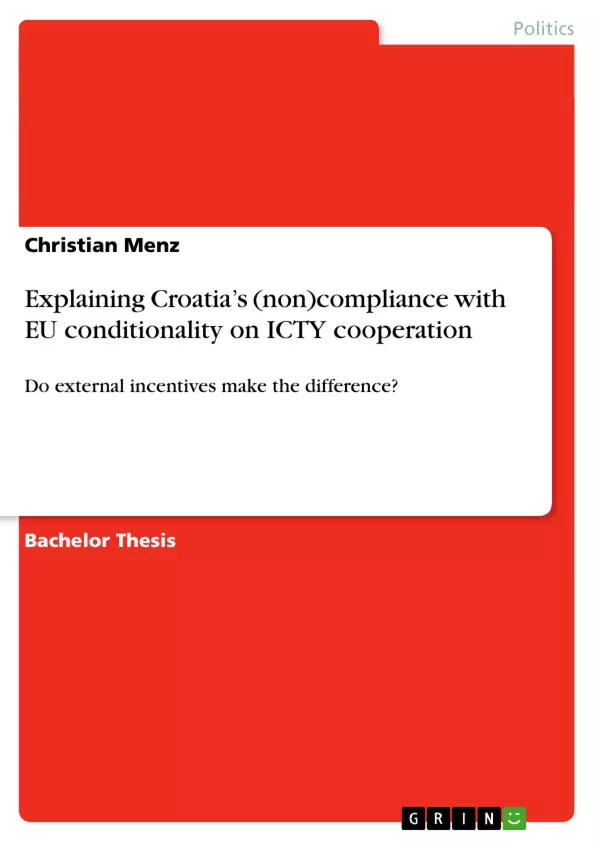Due to the positive experience with tying progress in negotiations with progress in reform in Central and Eastern Europe (CEE) the European Union (EU) made its membership offer to the Western Balkans (WB) countries conditional on specific democratic principles, most notably (full) cooperation with the International Criminal Tribunal for the former Yugoslavia (ICTY) and respect for the Dayton Peace Accord. Yet although EU membership is regarded as highly attractive both for political elites and the general public in the region, the erratic record of compliance with ICTY-related EU conditionality raises questions about the EU’s ability to provide for ‘rule transfer’ and ‘norm diffusion’ in the current enlargement round and poses a puzzle to scholars of international relations and EU enlargement alike.
As I will demonstrate for the case of Croatia, both the Račan (2000-2003) and Sanader governments (since 2003) have seen many ups and downs of ICTY cooperation. The core question this study addresses is: What factors explain variation in Croatia’s compliance with ICTY-related EU conditionality? The investigation period sets in with the democratic turn in 2000 and ends in December 2005, when the last remaining indictee left for The Hague.
Inhaltsverzeichnis (Table of Contents)
- Introduction
- Theoretical foundations and current state of research
- Theory and development of hypotheses
- The role of external factors in democratization research
- The external governance approach
- Basic concepts of rationalism and constructivism
- The external incentives model (EIM)
- Empirical findings on (non)compliance with EU conditionality
- Compliance with democratic conditionality
- Compliance with acquis conditionality
- Theory and development of hypotheses
- Methodology and research design
- Empirical analysis
- The role of ICTY conditionality within the EU enlargement framework
- The case of Croatia
- Introduction: the political context in Croatia
- Phase I: the Račan government (2000-2003)
- Phase II: The Sanader government (2003-2009)
- Conclusion
- Annex
- Bibliographical references
- Literature
- Documents
Zielsetzung und Themenschwerpunkte (Objectives and Key Themes)
This study aims to explain the variations in Croatia's compliance with ICTY-related EU conditionality, particularly within the framework of the EU's enlargement process. It seeks to understand the factors driving Croatia's fluctuating approach to cooperation with the International Criminal Tribunal for the former Yugoslavia (ICTY). The study focuses on the period from 2000, marking Croatia's democratic transition, to December 2005, when the last indicted individual was transferred to The Hague. The study leverages the external incentives model (EIM) as a theoretical framework to analyze this period, aiming to uncover key factors influencing Croatia's compliance. Key themes explored in this research include: * The role of external factors in democratization research and their impact on domestic reforms * The application of the external governance approach to understand the mechanisms underlying EU policy transfer and norm diffusion * The interplay of rationalist and constructivist theoretical frameworks within the EIM * Empirical analysis of Croatia's compliance with ICTY conditionality, considering factors like domestic political context, EU incentives, and domestic adoption costs * The relevance of the EIM in explaining Croatia's inconsistent pattern of compliance with ICTY conditionalityZusammenfassung der Kapitel (Chapter Summaries)
The study begins with an introduction that establishes the context of EU enlargement and its conditional approach to the Western Balkans, particularly regarding ICTY cooperation. It highlights the puzzle of inconsistent compliance with ICTY-related conditionality and introduces Croatia as the case study. Chapter 2 delves into the theoretical foundations of the research, reviewing the role of external factors in democratization studies, outlining the external governance approach, and exploring the logics of rationalism and constructivism. It then presents the EIM, highlighting its potential for explaining EU rule transfer and norm diffusion. The chapter concludes by discussing existing empirical findings on compliance with EU conditionality and identifying research gaps. Chapter 4 focuses on the empirical analysis of Croatia's compliance with ICTY conditionality, examining the role of this conditionality within the EU enlargement framework and analyzing the case of Croatia. It includes a detailed analysis of the political context in Croatia, focusing on the periods of the Račan (2000-2003) and Sanader (2003-2009) governments. The chapter utilizes process-tracing to identify crucial factors influencing Croatia's compliance pattern.Schlüsselwörter (Keywords)
This study focuses on EU enlargement, ICTY cooperation, Croatia, EU conditionality, external incentives model, rule transfer, norm diffusion, democratization, rationalism, constructivism, process-tracing, political context, domestic adoption costs, and compliance.Frequently Asked Questions
What is EU conditionality regarding the Western Balkans?
It refers to the set of requirements the EU imposes on countries like Croatia for membership progress, specifically full cooperation with the International Criminal Tribunal for the former Yugoslavia (ICTY).
Why was Croatia's compliance with the ICTY inconsistent?
The study explores factors like domestic political opposition, the high political cost of extraditing popular war figures, and the varying incentives offered by the EU during different government terms (Račan and Sanader).
What is the "External Incentives Model" (EIM)?
The EIM is a theoretical framework used to explain how external rewards (like EU membership) can drive domestic reforms, provided the benefits outweigh the domestic adoption costs.
What happened in December 2005 in Croatia?
This marked the end of the primary investigation period, as the last remaining high-profile indictee was transferred to The Hague, signaling a major step in Croatia's compliance.
What role did the Sanader government play in ICTY cooperation?
Despite its nationalist roots, the Sanader government (2003-2009) eventually facilitated full cooperation with the ICTY to secure the start of EU accession negotiations.
- Quote paper
- Christian Menz (Author), 2010, Explaining Croatia’s (non)compliance with EU conditionality on ICTY cooperation, Munich, GRIN Verlag, https://www.grin.com/document/232064



